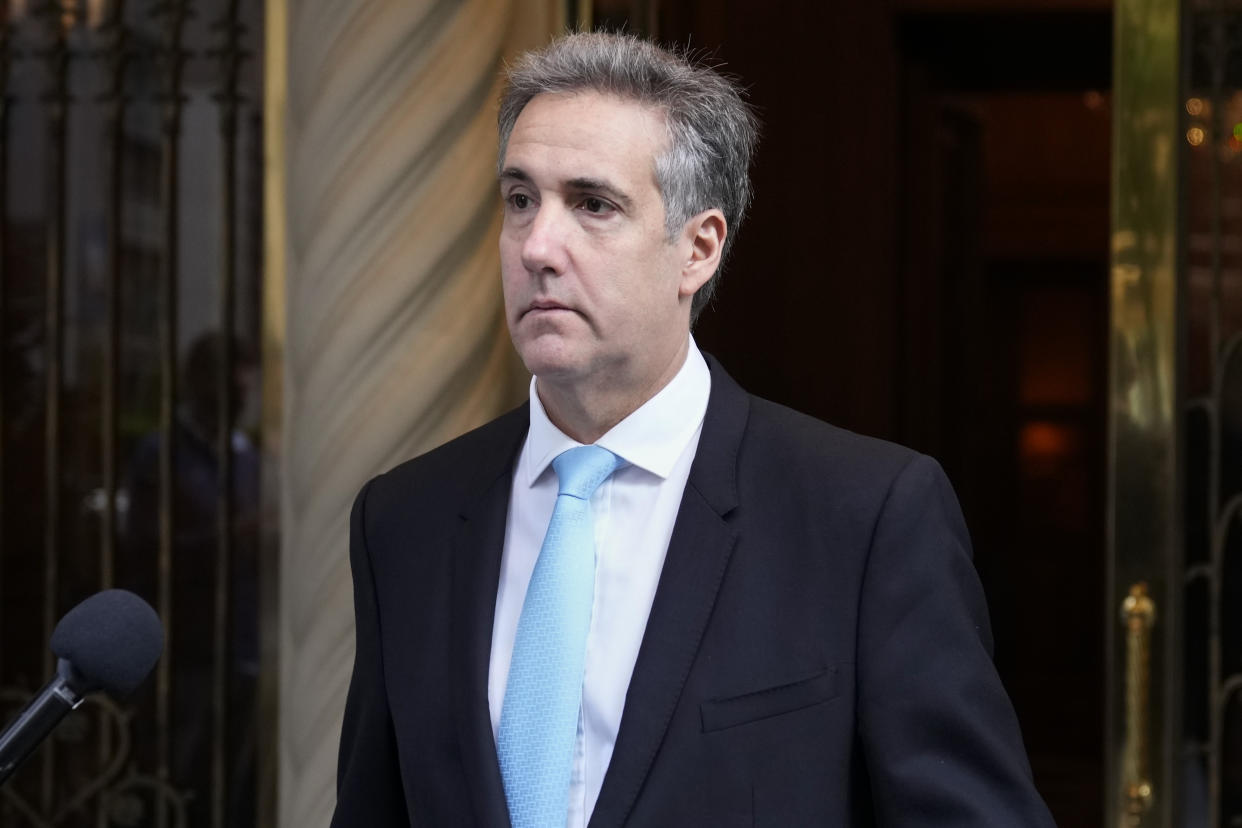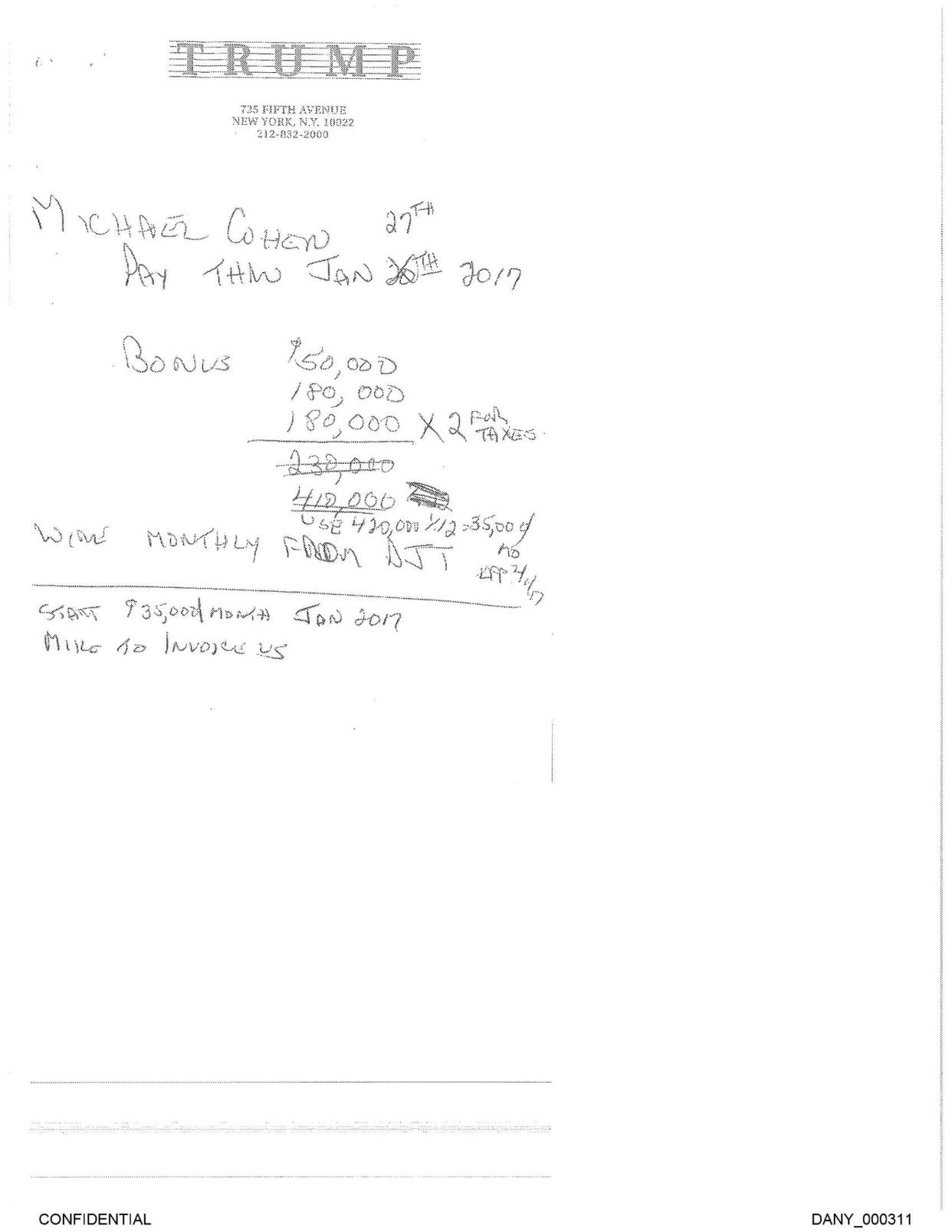Trump trial updates: Michael Cohen testifies about discussing hush money reimbursement with Trump in Oval Office, admits he wants to see him convicted

Former President Donald Trump’s former lawyer Michael Cohen detailed how he was reimbursed for the alleged hush money payment to Stormy Daniels — he’s also the prosecution’s last witness. This is Yahoo News’ succinct update on the criminal and civil cases against Trump. Here are the latest developments.
🚨 What happened today
Michael Cohen, Trump’s former lawyer and so-called “fixer,” was called to the witness stand for a second day to recount how he was reimbursed for a hush money payment made to adult film actress Stormy Daniels before the 2016 presidential election to keep her from sharing her story of an alleged 2006 sexual encounter with Trump.
Cohen testified about the aftermath of an April 2018 FBI raid of his apartment, office and hotel room and recalled the last conversation he had with Trump, who reassured him that everything would be “OK.” Cohen also detailed the moment he decided to turn on Trump, implicating the former president in the hush money payment when Cohen pleaded guilty to federal charges, some of which stemmed from that payment.
Prosecutors have charged Trump with 34 counts of falsifying business records in order to conceal criminal activity for allegedly disguising the reimbursement payments to Cohen as legal fees to protect his 2016 presidential campaign. Trump has pleaded not guilty to the charges and denies having an affair with Daniels in 2006.
Prosecutors want to demonstrate that Trump not only knew about the reimbursement payments to Cohen but that he also directed them. During a sprawling cross-examination, Trump’s defense team aimed to discredit Cohen by depicting him as someone who can’t be trusted, zeroing in on his hatred toward Trump and his reputation as a convicted felon and known liar.
🔬 Zoom in
The reimbursement plan: The prosecution asked Cohen about a Feb. 8, 2017, meeting he had with then-President Trump in the Oval Office about how he was going to be reimbursed for the hush money payment he made to Daniels before the 2016 election.
Cohen testified that Trump told him to arrange the repayment plan with Allen Weisselberg, the Trump Organization’s chief financial officer.
“I was sitting with President Trump, and he asked me if I was OK. He asked me if I needed money. And I said, ‘No, all good.’ He said because I can get a check. I said, ‘No, I’m OK.’ He said, ‘All right, just make sure you deal with Allen [Weisselberg],’” Cohen testified, according to CNN.
Remember, Weisselberg’s calculations detailed the $420,000 reimbursement plan he made with Cohen — including the hush money reimbursement, a bonus and other expenses — and was scheduled to be repaid over 12 months, broken down into $35,000 payments.

Prosecutors on Tuesday also showed jurors a series of emails from Trump Organization controller Jeffrey McConney, who testified last week, reminding Cohen to submit invoices for the monthly $35,000 payments.
When Cohen submitted the invoices, he said the check stubs indicated they were “pursuant to the retainer agreement,” according to CBS News. But Cohen testified that there was never a retainer agreement.
The real reason for the invoice, Cohen testified, was “the reimbursement to me of the ‘hush money’ fee, along with RedFinch and the bonus.”
The fallout: The prosecution asked Cohen about his loyalty to Trump, which remained intact even after the 2018 FBI raid. But after a pivotal conversation with his wife and children, in which Cohen says they argued that his loyalty should be to his family, Cohen said he decided “I would not lie for President Trump anymore.”
Soon after, Cohen pleaded guilty to campaign finance violations, tax evasion and lying to Congress, calling it “the worst day of my life,” according to NBC News. Cohen was sentenced to three years in federal prison for financial crimes and lying to Congress and began cooperating with prosecutors. He ultimately served 13 months in prison and a year and a half under house arrest.
Cohen’s cross-examination: After the court returned from a lunch break, Trump’s defense attorney Todd Blanche cross-examined Cohen, pressing him on his public comments about Trump and the hush money case. Cohen conceded that he does want to see Trump convicted in this case and that he makes money on social media by talking about Trump’s criminal trial.
Trump’s political posse: U.S. House Speaker Mike Johnson became the highest-ranking Republican to support Trump at the courthouse Tuesday, using his position to attack the hush money case. Also making an appearance were possible contenders in Trump’s veepstakes: Rep. Byron Donalds of Florida, North Dakota Gov. Doug Burgum and former GOP presidential candidate Vivek Ramaswamy.
Trump’s appeal on gag order rejected: A New York appeals court on Tuesday rejected Trump’s request to overturn the gag order against him. Judge Juan Merchan has held Trump in contempt 10 times for violating the gag order and has threatened the former president with jail time for future violations.
🗓 What’s next?
Trump’s lawyers will continue their cross-examination of Cohen on Thursday morning — they believe they can finish cross-examination before court adjourns at 4 p.m. ET. Cohen was the prosecution’s last witness to be called, and it remains to be seen whether the defense will present their case. Court will not be in session on Friday, May 17, so that Trump can attend his son Barron’s high school graduation.
📖 The background
⚖️ Trump’s trials and legal cases
Correction: A previous version of this article misstated who wrote the notes that were submitted into evidence. They were Allen Weisselberg's calculations, written by Jeffrey McConney.
